Old Testament
Genesis Exodus Leviticus Numbers Deuteronomy Joshua Judges Ruth 1 Samuel 2 Samuel 1 Kings 2 Kings 1 Chronicles 2 Chronicles Ezra Nehemiah Esther Job Psalms Proverbs Ecclesiastes Song of Solomon Isaiah Jeremiah Lamentations Ezekiel Daniel Hosea Joel Amos Obadiah Jonah Micah Nahum Habakkuk Zephaniah Haggai Zechariah Malachi2 Kings 24:3 Similar Verses
2 Kings 24:3 Cross References
Surely at the commandment of the LORD came this upon Judah, to remove them out of his sight, for the sins of Manasseh, according to all that he did;
Uncover the Rich Themes and Topics of This Bible Verse
Listed below are the Bible themes associated with 2 Kings 24:3. We invite you to explore each theme to gain deeper insights into the Scriptures.
2 Kings 24:3 Cross Reference Verses
This section features a detailed cross-reference designed to enrich your understanding of the Scriptures. Below, you will find carefully selected verses that echo the themes and teachings related to 2 Kings 24:3 KJV. Click on any image to explore detailed analyses of related Bible verses and uncover deeper theological insights.

2 Kings 18:25 (KJV) »
Am I now come up without the LORD against this place to destroy it? The LORD said to me, Go up against this land, and destroy it.
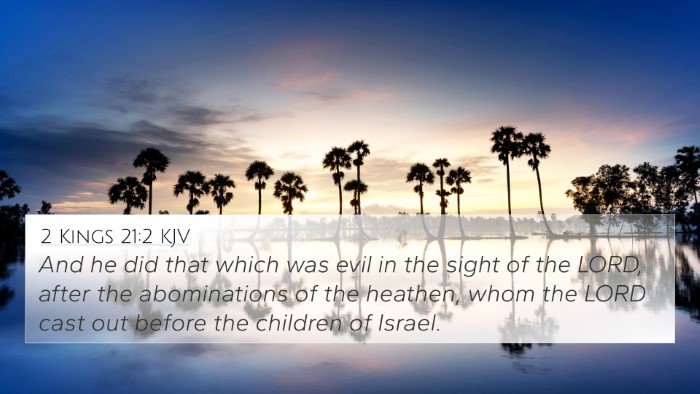
2 Kings 21:2 (KJV) »
And he did that which was evil in the sight of the LORD, after the abominations of the heathen, whom the LORD cast out before the children of Israel.

2 Kings 23:26 (KJV) »
Notwithstanding the LORD turned not from the fierceness of his great wrath, wherewith his anger was kindled against Judah, because of all the provocations that Manasseh had provoked him withal.

2 Chronicles 24:24 (KJV) »
For the army of the Syrians came with a small company of men, and the LORD delivered a very great host into their hand, because they had forsaken the LORD God of their fathers. So they executed judgment against Joash.

Isaiah 45:7 (KJV) »
I form the light, and create darkness: I make peace, and create evil: I the LORD do all these things.

Isaiah 46:10 (KJV) »
Declaring the end from the beginning, and from ancient times the things that are not yet done, saying, My counsel shall stand, and I will do all my pleasure:

Isaiah 10:5 (KJV) »
O Assyrian, the rod of mine anger, and the staff in their hand is mine indignation.

Jeremiah 15:1 (KJV) »
Then said the LORD unto me, Though Moses and Samuel stood before me, yet my mind could not be toward this people: cast them out of my sight, and let them go forth.
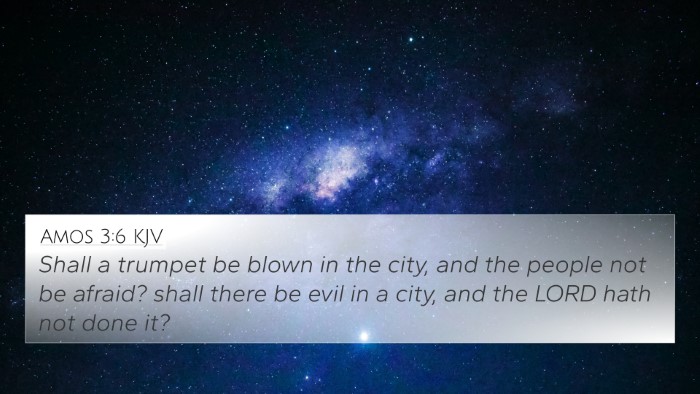
Amos 3:6 (KJV) »
Shall a trumpet be blown in the city, and the people not be afraid? shall there be evil in a city, and the LORD hath not done it?

2 Chronicles 25:16 (KJV) »
And it came to pass, as he talked with him, that the king said unto him, Art thou made of the king's counsel? forbear; why shouldest thou be smitten? Then the prophet forbare, and said, I know that God hath determined to destroy thee, because thou hast done this, and hast not hearkened unto my counsel.

Genesis 50:20 (KJV) »
But as for you, ye thought evil against me; but God meant it unto good, to bring to pass, as it is this day, to save much people alive.

Joshua 23:15 (KJV) »
Therefore it shall come to pass, that as all good things are come upon you, which the LORD your God promised you; so shall the LORD bring upon you all evil things, until he have destroyed you from off this good land which the LORD your God hath given you.
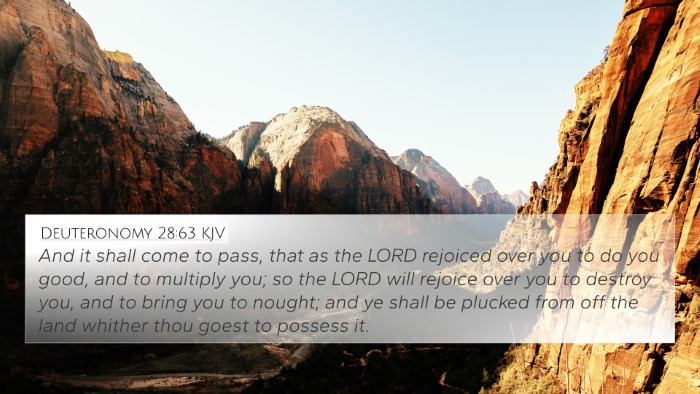
Deuteronomy 28:63 (KJV) »
And it shall come to pass, that as the LORD rejoiced over you to do you good, and to multiply you; so the LORD will rejoice over you to destroy you, and to bring you to nought; and ye shall be plucked from off the land whither thou goest to possess it.
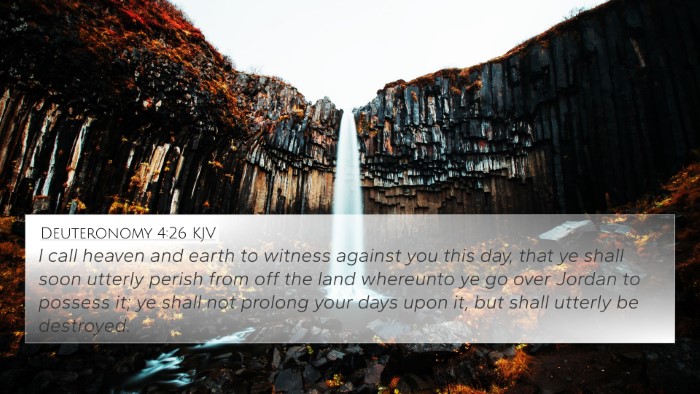
Deuteronomy 4:26 (KJV) »
I call heaven and earth to witness against you this day, that ye shall soon utterly perish from off the land whereunto ye go over Jordan to possess it; ye shall not prolong your days upon it, but shall utterly be destroyed.

Deuteronomy 29:28 (KJV) »
And the LORD rooted them out of their land in anger, and in wrath, and in great indignation, and cast them into another land, as it is this day.

Leviticus 26:33 (KJV) »
And I will scatter you among the heathen, and will draw out a sword after you: and your land shall be desolate, and your cities waste.
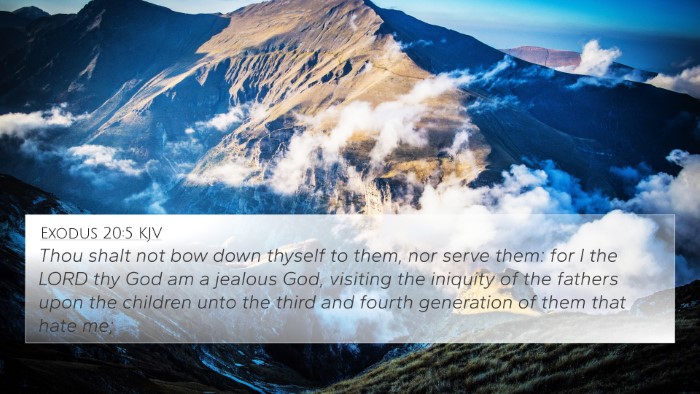
Exodus 20:5 (KJV) »
Thou shalt not bow down thyself to them, nor serve them: for I the LORD thy God am a jealous God, visiting the iniquity of the fathers upon the children unto the third and fourth generation of them that hate me;

Micah 2:10 (KJV) »
Arise ye, and depart; for this is not your rest: because it is polluted, it shall destroy you, even with a sore destruction.
2 Kings 24:3 Verse Analysis and Similar Verses
Understanding 2 Kings 24:3
The verse 2 Kings 24:3 states: "Surely at the commandment of the Lord came this upon Judah, to remove them out of his sight, for the sins of Manasseh, according to all that he did."
Summarized Meaning from Commentaries
This verse highlights the divine judgment upon Judah as a result of the sins committed during the reign of King Manasseh. The reference indicates that God, in His sovereignty, allowed the judgment to unfold in accordance with His commands. Various public domain commentaries lend insight into this passage, each reinforcing the themes of sin, judgment, and divine justice.
Insights from Matthew Henry
Matthew Henry emphasizes the inevitability of judgment when a nation turns away from God. He notes that God's patience has limits and that the sins of leaders profoundly impact the spiritual state of the people. Manasseh's reign is highlighted as particularly sinful, and it serves as a warning of how leadership can lead a nation into disobedience.
Insights from Albert Barnes
Albert Barnes further explains that the judgment described was not arbitrary. He suggests that God’s actions were deeply rooted in the covenantal relationship between Himself and His people. The passage reflects the principle of divine retribution, where persistent sin leads to eventual consequences. Barnes points out that Manasseh's idolatry stirred God's wrath, leading to a necessary correction through exile.
Insights from Adam Clarke
Adam Clarke interprets the verse by reminding readers of the history of Israel's kings. He draws connections between the sinfulness of rulers and the downfall of their nations. Clarke illustrates that while individuals may encounter grace, national sin can invoke swift judgment. The sins of Manasseh are underscored as catalysts for the impending disaster for Judah.
Related Bible Cross-References
- 2 Kings 21:16 - Describes the bloodguilt of Manasseh and how he filled Jerusalem with innocent blood.
- 2 Chronicles 33:9-10 - Details Manasseh’s leading Judah astray and God's admonitions to him.
- Jeremiah 15:4 - Indicates the calamity brought upon Judah due to Manasseh's sins.
- 2 Kings 23:26 - Further explains the wrath of the Lord, triggered by the sins of past kings, including Manasseh.
- Deuteronomy 28:36-37 - Discusses the curses that will come upon a nation for forsaking God, echoing the themes in 2 Kings 24:3.
- Isaiah 1:4 - Describes the rebellion of a nation that has turned against God, much like Judah under Manasseh's influence.
- 2 Kings 17:18 - Discusses God’s removal of Israel from His sight due to its multiplied sins, analogous to the fate of Judah.
- Hosea 4:1-3 - Mentions the absence of truth and mercy in the land, which aligns with the conditions during Manasseh's reign.
- Micah 3:12 - Talks about the destruction of Jerusalem promised because of leaders’ corrupt actions, resonating with the scenario depicted in 2 Kings 24:3.
- Acts 7:43 - Quotes from the prophets highlighting the concern of idolatry, a primary aspect of Manasseh's actions.
Thematic Connections
The themes present in 2 Kings 24:3 offer profound insights into God's justice and the repercussions of sin within the community. Understanding this scripture can be enhanced through tools for Bible cross-referencing, allowing readers to discover the interconnectedness of biblical themes.
- Leadership and Accountability: The verse refutes the notion of leaders being above reproach, illustrating how their actions influence the moral compass of a nation.
- The Nature of Divine Judgment: This passage serves as an example of how sin invites judgment, reinforcing the idea that God is just and He holds nations accountable for their wickedness.
- Grace Amidst Judgment: Readers might also contemplate on manasseh’s eventual repentance as hinted in 2 Chronicles, providing a contrasting view of the potential for redemption despite severe consequences.
Guidelines for Advanced Study
For individuals aiming for a deeper understanding of this verse and its implications, consider employing the following strategies:
- Utilize a Bible concordance: This tool helps in locating where similar themes of sin and judgment appear throughout the Bible.
- Engage in cross-reference Bible studies: Explore how this scripture relates to others, offering insights into God’s character and the necessity of repentance.
- Analyze connections between Old and New Testament: Examine how themes of judgment are echoed in the New Testament with instances such as the teachings of Jesus regarding repentance.
- Participate in group discussions: Discussing with others can unveil different interpretations and enhance comprehension of the verse’s significance.
- Cross-reference Biblical texts: Look for verses that connect to the themes of God's sovereignty and human disobedience.
- Explore inter-Biblical dialogue: Investigate how different books address God’s expectations and the consequences of Israel's unfaithfulness.


